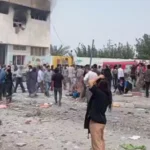
Charlie Kirk’s murder became fuel for retaliation speeches and expanded the polarization climate that chokes American democracy
Charlie Kirk’s violent death, a conservative activist and influential figure in American politics, plunged the country into an even greater climate of tension. Instead of generating moments of silence or reflection, as some could wait for the tragedy, the episode quickly turned into fuel into a new wave of verbal attacks and appeals to retaliation against the political left.
In the hours of the crime, the right -wing blogosphere boiled. An influencer wrote that the liberals had “blood in their hands.” Elon Musk, in turn, classified the left as the “party of murder.” And a blogger even argued that every democratic politician “must be arrested and the banned party.” Aggressive rhetoric spread with speed, reinforcing the polarization climate that dominates the United States.
The fear that the tragedy is used as a justification for hardening measures against opponents has grown even more in the position of former President Donald Trump. Known for overcoming institutional limits, Trump was appointed by experts as someone willing to turn the episode into the pretext to broaden powers and weaken opponents.
“Trump clearly has a finger on the light trigger when it comes to declaring a state of emergency and circumventing norms, laws and even the Constitution,” warned Steven Levitsky, professor of government at Harvard University and co -author of the book How Democracies Die. For him, the situation can make room for “streets on the streets” and initiatives to pursue political opposition.
These fears were reinforced in a televised pronouncement on Wednesday night. Even before the shooter was identified or any confirmed motivation, Trump attributed the murder to the radical left. “For years, the radical left has compared wonderful Americans like Charlie to Nazis and the worst mass killers and criminals in the world,” he said. “This kind of rhetorical is directly responsible for the terrorism we see in our country today, and needs to end now.”
The next day, the tone did not change. “We have a radical group of left lunatics out there, simply lunatics, and we will solve this problem,” said Trump, further harming his speech.
Some of his allies in Congress went further. Republican deputy Nancy Mace of South Carolina said directly: “Democrats are responsible for what happened today.”
The former president’s stance generated criticism between academics and analysts. Donald Moynihan, professor of public policy at the University of Michigan, lamented the opportunity missed by the White House. “Trump could have used his speech in the oval hall to condemn all forms of political violence and emphasize the importance of tolerance as a cornerstone of democracy. But he didn’t do it,” he said. “The worst scenario is that Kirk’s murder is used to justify a government repression of freedom of expression.”
The hardest tone also extended to the international scene. Deputy Secretary of State Christopher Landau announced that foreigners who “praise, rationalize or despise” Kirk’s murder would not be considered “welcome visitors to our country”, signaling a diplomatic siege in the name of the activist’s memory.
Charlie Kirk’s case adds to a series of attacks that in recent years have reached political figures from both the right and left. The escalation of violence, reflected in the inflamed discourse of leaders and influencers, exposes an increasingly divided and vulnerable society to hate explosions.
The murder, instead of uniting, deepens already open wounds. At a time when the country could seek out of moderation, the risk that tragedy will become another milestone in the radicalization cycle that threatens the democratic stability of the United States.
Charlie Kirk’s murder occurs at a time when political violence was already marking the public life of the United States. Donald Trump himself survived an attempted murder during a rally last year. More recently, in June, a state democratic deputy in Minnesota and her husband were killed indoors. In April, the residence of Pennsylvania Democratic Governor Josh Shapiro was set on fire as he and his family were inside.
Although the country has a history of bloody episodes – the 1960s was marked by a series of political figures murders, accompanied by urban protests and racial conflicts – experts say the current scenario is distinct. The differential, according to them, is in the context: the consolidation of Trump’s influence on crucial institutions and the unprecedented expansion of the presidency’s powers.
“It is at this moment that an aggressive president, acting in an aggressive direction, can be dangerous,” said Julian Zelizer, professor of political history at Princeton University. “There are literally federal troops on the streets of American cities, and Trump is using the federal force whenever he wants.”
This perception of risk was amplified by the rhetoric of conservative influencers who began to draw direct parallels between Kirk’s death and dark historical episodes. Many compared the murder to the German Parliament fire in 1933, used by the Nazis as a justification to pursue opponents and dismantle constitutional freedoms.
“The murder of Charlie Kirk is the fire of the American Reichstag,” said Matt Servy, a right -wing writer and blogger. In his assessment, the moment should mark the beginning of a broad and unprecedented repression against the left. “Democratic politicians should be arrested and the banned party. It’s time for total left repression,” he said.
Influential voices near Trump’s circle reinforced this tone. Katie Miller, wife of White House’s certificate, Stephen Miller, published on her social networks: “You called us Hitler. You called us Nazis. You called us racists. You have blood in your hands.”
Even republican leaders traditionally seen as more moderate adhered to the left -winging discourse. Congressman Warren Davidson of Ohio said in an interview with CNN that the escalation of political violence is linked to the way liberals dehumanize opponents. “When they lose the debate, they cannot focus on facts and arguments,” he criticized. “They appeal to insults – saying that someone must be racist, intolerant, misogynist or a Christian nationalist.”
The portrait that emerges, therefore, is that of a boiling country, in which each new act of violence is immediately instrumentalized as ammunition in the cultural and party war. For experts, the risk is that, instead of seeking a pact of democratic coexistence, Kirk’s tragedy further deepens the logic of confrontation that already erodes American political life.
Some analysts point out that the incendiary atmosphere cannot be attributed to just one political field. For them, the responsibility to contain the climb of hatred is shared. “Democratic leaders also need to contain cheerful videos in the X celebrating the murder of Charlie Kirk,” said Robert Pape, professor of political science at the University of Chicago. “Both leadership groups have work to contain their voters.”
But so far, the signs walk in the opposite direction. For Harvard University Steven Levitsky, the two main parties in the United States are at an unprecedented antagonism level, no longer like legitimate rivals, but as irreconcilable enemies. “The parties are accusing each other of unfair and antipatriotic behavior, in a way that resembles Spain of the 1930s, shortly before the collapse of the democratic system,” he said.
This scenario, he said, is alarming. “When two parts see themselves as an existential threat, the temptation to get involved in violent and illegal behaviors is very high. And Kirk’s murder can reinforce it.”
The episode, which could serve as a warning for a collective effort of national reconciliation, eventually became another division catalyst. Instead of uniting, tragedy fueled the cycle of hostility and distrust that crosses American politics.
Whether in leaders’ statements, fiery speeches, or social networks, Charlie Kirk’s murder exposes a country on the brink of an abyss: divided, radicalized and with her democracy put to the test for the violence that insists on repeating.
With information from Financial Times*
Source: https://www.ocafezinho.com/2025/09/12/direita-americana-promete-vinganca-em-nome-de-kirk/

